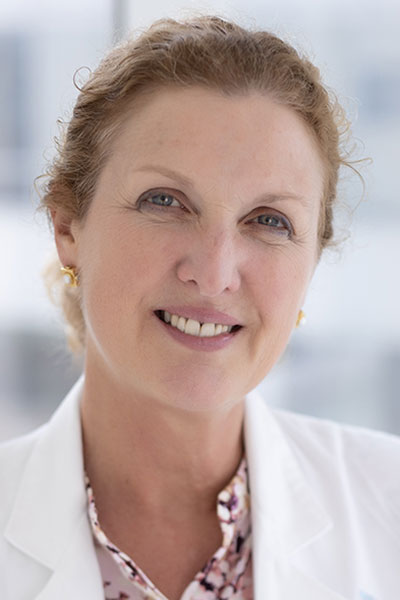
Expert, and sometimes conflicting, opinions in breast cancer treatment are nothing new. But SABCS 2022 features a new way to present those opinions in two special Controversies sessions featuring “lightning discussions” between experts in the field on three different topics.
The first of these two special sessions, Clinical Controversies, will be held on Wednesday, December 7 at 2:00 pm CT, in Hall 3 of the convention center. There will be two expert discussants for each of three topics; the moderator is Lisa Carey, MD, ScM, FASCO, Deputy Director of Clinical Sciences, UNC Lineberger Comprehensive Cancer Center.
“These experts are people who are extremely knowledgeable in areas of clinical debate and may have differing perspectives,” Dr. Carey said. “They can frame the relevant issues and why there is controversy. They will also give their personal opinions of the strength of the existing data and how they approach these issues in their practices.”
Topic 1: To Clip or Not to Clip
Discussants: Abigail Caudle, MD, Associate Professor, Breast Surgical Oncology, MD Anderson Cancer Center, and Viviana Galimberti, MD, MPH, Director, Breast Cancer Surgery, European Institute of Oncology.
This surgical topic stirs debate on how to manage the axilla as surgeons are trying to minimize dissection, Dr. Carey said.
One of the questions is whether to do only a node biopsy of just the sentinel nodes or to clip known positive nodes and remove them as well.
“The reason that is controversial is because about a quarter of the time that sentinel process doesn’t pick up the clipped node and so you may be leaving behind a known positive node,” Dr. Carey said. “Whether that’s prognostically important or not, given all the other things that we do to patients systemically and with radiation, is what is unknown. That will be a topic of discussion.”
Topic 2: Duration of Endocrine Therapy
Discussants: Kathryn Ruddy, MD, PhD, Professor of Oncology, Mayo Clinic, and Eleftherios “Terry” Mamounas, MD, MPH, FACS, Director, Comprehensive Breast Program, Orlando Health Cancer Institute.
This systemic therapy topic deals with the question: How long should a patient be treated with anti-estrogen therapy?
“We know that one year is better than none, two is better than one and five is better than two,” Dr. Carey said. “But there’s a diminishing return on each of those, and some patients probably benefit more from long treatments while others don’t get much benefit. Anti-estrogen therapy has toxicity, it can make patients uncomfortable, and can accelerate osteoporosis. A little discomfort or morbidity goes a long way when you’re treating for years. We will talk about strategies to get smarter about directing longer therapies to those that really need it.”
Topic 3: Post-neoadjuvant Therapy in Triple-Negative Breast Cancer
Discussants: Heather McArthur, MD, MPH, Associate Professor, Hematology/Oncology, UT Southwestern, and Susan Domchek, MD, Professor of Oncology, University of Pennsylvania.
The third topic also relates to systemic therapy and has been a subject of active debate in recent years.
For patients on the opposite end of the spectrum from hormone receptor-positive breast cancer, almost all are treated neoadjuvantly with multiple chemotherapy drugs, and immunotherapy given both preoperatively with the chemotherapy as well as postoperatively for a total of one year.
But there are many unanswered questions.
“The patients who achieved a pathologic complete response or pCR, regardless of whether they received chemotherapy alone or with immunotherapy, did well with at least 92% event-free three years after diagnosis. Conversely, while those with residual disease benefited from receiving immunotherapy, about one in three relapsed within those three years, so we still have work to do,” Dr. Carey said.
In addition, immunotherapy can have autoimmune side effects, and not much is known about long-term implications of these drugs.
“One question is, if they get the benefit of the immune checkpoint inhibitor plus chemotherapy, and they’ve already achieved a pathologic complete response, do you need to continue the immunotherapy for the rest of that year?” Dr. Carey said.
Additional questions for the discussants include whether to give additional chemotherapy in patients with residual disease, and when to introduce other treatments such as the PARP inhibitor olaparib or radiation.
Even though advances have been made, much remains unknown, Dr. Carey said, and that will give the discussions even more weight.
One of the things that elevates SABCS is sessions like these that give attendees perspective from experts in specific areas. The symposium makes breast cancer experts accessible and approachable.
“It’s incredibly valuable to hear opinions on where an expert’s own level of comfort would let them go in areas where there isn’t a clear guide,” Dr. Carey said. “That’s a unique opportunity that SABCS has provided for years.”

